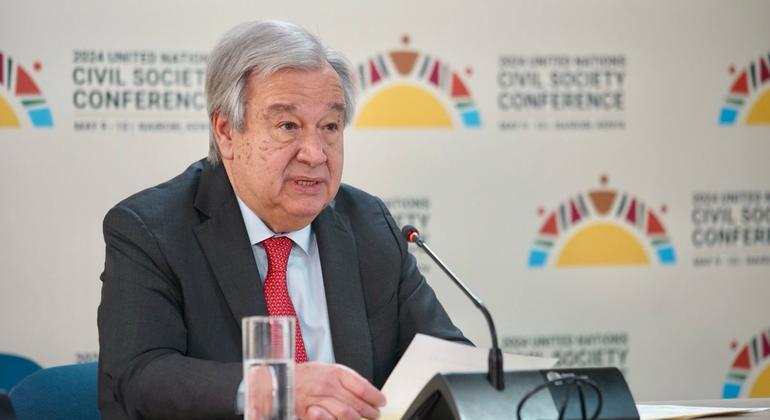But now, there could be an easier alternative in the form of patches that can be simply applied to the skin, much like a sticking plaster.
Early data from a vaccine patch trial in the Gambia has shown promising indications that it could be effective in protecting children from measles.
The UN World Health Organization (WHO) has been helping to develop these vaccine microarray patches – or MAPS – as they are known, for several years already.
Birgitte Giersing, team lead at WHO’s Vaccine Product and Delivery Research Unit, said that the patches could be a major breakthrough in protecting vulnerable populations from preventable diseases.
Groundbreaking potential
“They are potentially groundbreaking vaccine delivery technology that could really contribute to increasing the coverage of life saving vaccines like measles and rubella…especially in low resource settings”, she told reporters in Geneva.
“And this is because they can be more easily delivered than vaccines that need to be injected, especially in outbreaks or in humanitarian emergency situations.”
Dr. Giersing explained that the patches could be especially useful in combating measles and rubella. Vaccines for both of these diseases have been available for decades but coverage levels dropped during the COVID-19 pandemic and now there are many millions of susceptible children in many countries.
“People may be more willing to be vaccinated by a patch than by a needle, so there’s really an acceptability advantage” to the patches, Dr Giersing said.
First ever guidelines to lower infection rates due to catheters published
In further health news, WHO on Thursday published the first global guidelines to prevent bloodstream and other infections caused by use of catheters placed in minor blood vessels while patients are undergoing minor procedures.
Poor practices in the routine use of catheters – how they are inserted and removed in the arm for example – can lead to a high risk of infections entering the system via the blood.
Serious consequences
This can lead to serious conditions such as sepsis, and difficult-to-treat complications in major organs like the brain and kidneys, WHO said.
Soft tissue infections at the insertion site of the catheter can also occur.
People who receive treatments through catheters are often particularly vulnerable to infections, as they might be seriously ill or have low immunity.
WHO estimates that from 2000 to 2018, average mortality among patients affected by healthcare-associated sepsis was 24.4 per cent, increasing to 52.3 per cent among patients treated in intensive care units.
“Infections associated with health care delivery represent a preventable tragedy and a serious threat to the quality and safety of health care,” said Dr. Bruce Aylward, WHO Assistant Director-General.
“Implementing clean care and infection prevention and control recommendations is critical to saving lives and alleviating a great deal of avoidable suffering experienced by people around the world.”
The new guidelines include 14 good practice statements and 23 recommendations on key areas for health workers, including better education and training for health workers.
Former Guantanamo Bay detainee faces revictimisation in Algeria: Rights experts
A former Guantanamo Bay prisoner now facing terrorism charges in Algeria should have the case against him thrown out because he has no chance of a fair trial, independent rights experts said on Thursday.
Saeed Bakhouche was transferred from the US detention centre to Algeria in April 2023, under assurances that he would be humanely treated.
But he was immediately arrested in Algeria, “detained incommunicado…threatened in interrogation and denied legal representation”.
In the dock
He is due to be tried later this month, said the rights experts, who report to the Human Rights Council, receive no salary and are fully independent of any government or organization.
In a statement, the human rights experts who include Ben Saul, Special Rapporteur on countering terrorism, said that Mr. Bakhouche spent more than 20 years at the notorious US military prison in Cuba which was opened to hold suspected terrorists after the 9/11 attacks.
Mr. Bakhouche was tortured at Guantanamo and suffers post-traumatic stress disorder and depression, noted the experts, who warned that he “could not receive a fair and public trial in a national security case” in Algeria.
Among their other concerns, the rights experts highlighted the “overly broad definition of terrorism offences” in Algeria and the threat that Mr. Bakhouche would be detained in prisons “with documented risks of torture”.





